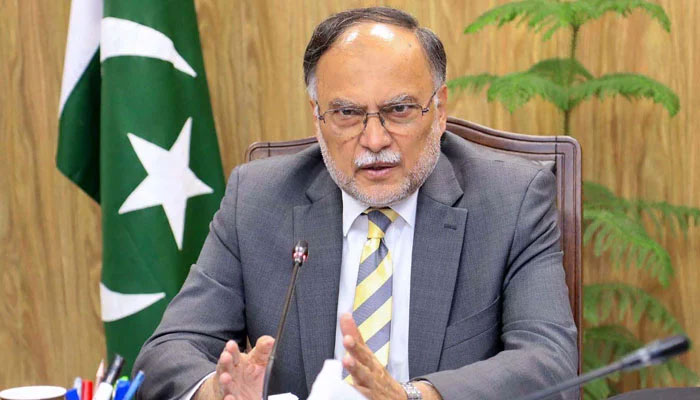Minister for civil service training enhancements
Ahsan advises the FPSC to revise the curriculum and reconsider the subjects offered
ISLAMABAD: The third meeting of the committee constituted by the prime minister on “Civil Service Reforms” was held under the chairmanship of Federal Minister for Planning, Development, and Special Initiatives Ahsan Iqbal, here Saturday.
During the second meeting of the committee, five sub-committees were constituted to refine the recruitment process, enhance appropriate training, undertake institutional restructuring, improve compensation and manage performance. In the first two meetings, held under the leadership of the planning minister, proposals prepared by the Ministry of Planning in consultation with stakeholders during 2013-18 were deliberated.
Two reports, specifically on refining the recruitment process and appropriate training, were discussed during the meeting. The Establishment Division made a detailed presentation, prepared in consultation with the FPSC, which highlighted the existing issues and challenges related to the CSS exam and recruitment. The findings from the screening test results analysed over the last few years since its introduction were also deliberated, along with current problems in the CSS curriculum.
It was observed that the current CSS curriculum and examination process do not encourage critical thinking. The predictable style of examination has led to a surge in commercial academies, which only candidates from affluent backgrounds can afford.
To discourage this practice, the minister advised the FPSC to revise the curriculum and reconsider the subjects offered. Emphasising the need for effective marketing for recruitment, the minister advised the FPSC to conduct rigorous campaigns to attract as many candidates as possible to participate in the CSS exam, similar to global companies that target universities across the country to hire their HR.
With the right mentoring and access to preparatory material, these candidates can pass the exam, he said. The minister said that a proactive recruitment programme will enable candidates in backward areas to prepare for the CSS. “There are 8,000 to 10,000 women studying at Quetta University, and the new CSS exam structure should be easier for them,” said the minister.
Regarding psychological assessment, the minister instructed the committee to use psychometric analysis to evaluate candidates’ attitudes, particularly for signs of extremist tendencies.
Giving the example of the Punjab Police, he said that there is currently no system in place for psychological evaluation in any police academy in the country.
Ahsan Iqbal also suggested incorporating best practices from corporate giants into the reform proposals. “We need to borrow from the best practices of companies like Engro, McKinsey, etc., to create the highest standards for civil service training,” he added.
The director general of the Civil Service Academy made a detailed presentation on the existing training regime and briefed the minister on the structure and themes of the Common Training Programme. Stressing the pivotal role of soft skills in leadership, the minister directed the DG to focus on developing the soft skills of newly inducted officers. “We need to understand that real leaders possess exceptional soft skills that motivate people to work with them,” he said.
A special focus on soft skills training can help reduce the leadership deficit, the minister stated. The minister also mentioned that public-private partnerships are the future of the civil sector, and thus training related to partnering with the private sector should be considered. He further suggested introducing AI in governance as a module during training. The meeting concluded with the note that working papers prepared by the subcommittees will be shared with all stakeholders for their formal input. The next meeting will be held in the coming week to review and discuss the remaining subcommittees’ reports.
-
 Justin Timberlake Receives Rare Advice To Win Latest Legal Battle Post 'embarrassing' June 2024 DUI Arrest
Justin Timberlake Receives Rare Advice To Win Latest Legal Battle Post 'embarrassing' June 2024 DUI Arrest -
 Prince William Shows Support For Community Hit Hard By Worst Storm In Decades
Prince William Shows Support For Community Hit Hard By Worst Storm In Decades -
 Prince William Heckled Over Andrew In Cornwall
Prince William Heckled Over Andrew In Cornwall -
 Harper Beckham Takes The Driving Seat Bring Back Estranged Brother Brooklyn Into Family
Harper Beckham Takes The Driving Seat Bring Back Estranged Brother Brooklyn Into Family -
 'Gladiators' Icons Returning After 25 Years?
'Gladiators' Icons Returning After 25 Years? -
 Savannah Guthrie's First Interview Since Mom Nancy Missing On The Cards?
Savannah Guthrie's First Interview Since Mom Nancy Missing On The Cards? -
 Margot Robbie Shared Nostalgic Inspiration Behind Tiny, Meticulous Details Of 'Barbie' World
Margot Robbie Shared Nostalgic Inspiration Behind Tiny, Meticulous Details Of 'Barbie' World -
 Travis Kelce Angers Taylor Swift Fans With Kai Trump Encounter
Travis Kelce Angers Taylor Swift Fans With Kai Trump Encounter -
 Britney Spears Arrested Over Drunk Driving By Highway Police
Britney Spears Arrested Over Drunk Driving By Highway Police -
 'The Beauty' Finale Explained: Evan Peters Teases What's Next
'The Beauty' Finale Explained: Evan Peters Teases What's Next -
 Britney Spears Gets Relief After Latest Court Order Against 'criminal' Stalker
Britney Spears Gets Relief After Latest Court Order Against 'criminal' Stalker -
 Trump Aide Thomas Fugate Interned At Group Behind Prince Harry Lawsuit
Trump Aide Thomas Fugate Interned At Group Behind Prince Harry Lawsuit -
 Hilary Duff Opens Up About The Price She Paid As A Child Star
Hilary Duff Opens Up About The Price She Paid As A Child Star -
 Andrew’s Isolation At Wood Farm Explained: Here’s Why Charles Is Staying Away
Andrew’s Isolation At Wood Farm Explained: Here’s Why Charles Is Staying Away -
 Italy Ready To Mitigate Economic Impact Of Middle East Crisis, Says Antonio Tajani
Italy Ready To Mitigate Economic Impact Of Middle East Crisis, Says Antonio Tajani -
 Sydney Sweeney Falsely Linked To Ottawa Senators' Brady Tkachuk
Sydney Sweeney Falsely Linked To Ottawa Senators' Brady Tkachuk




